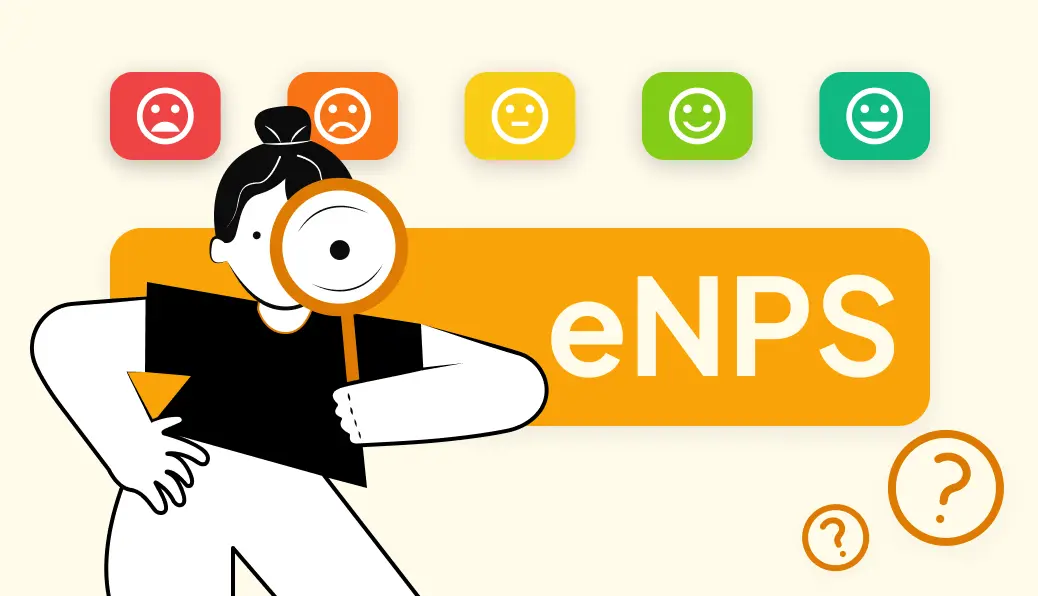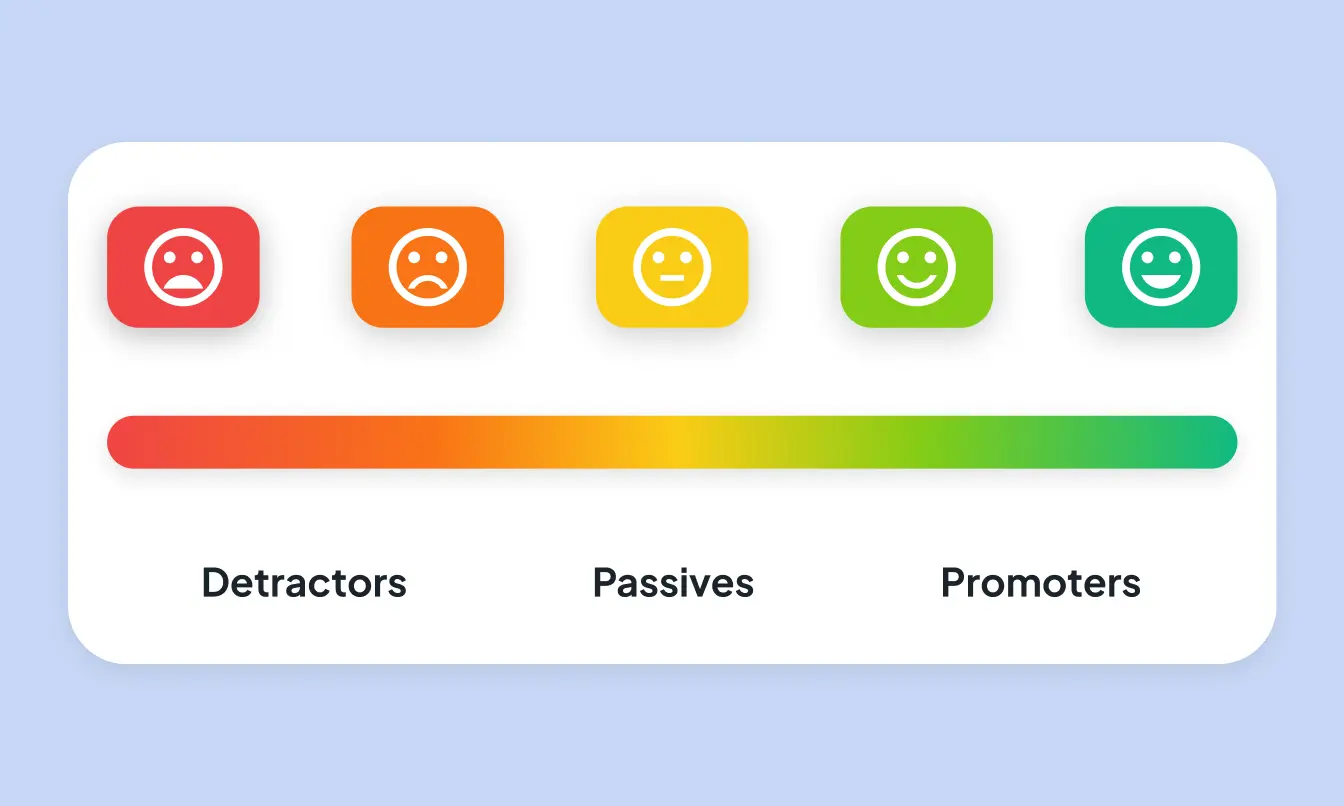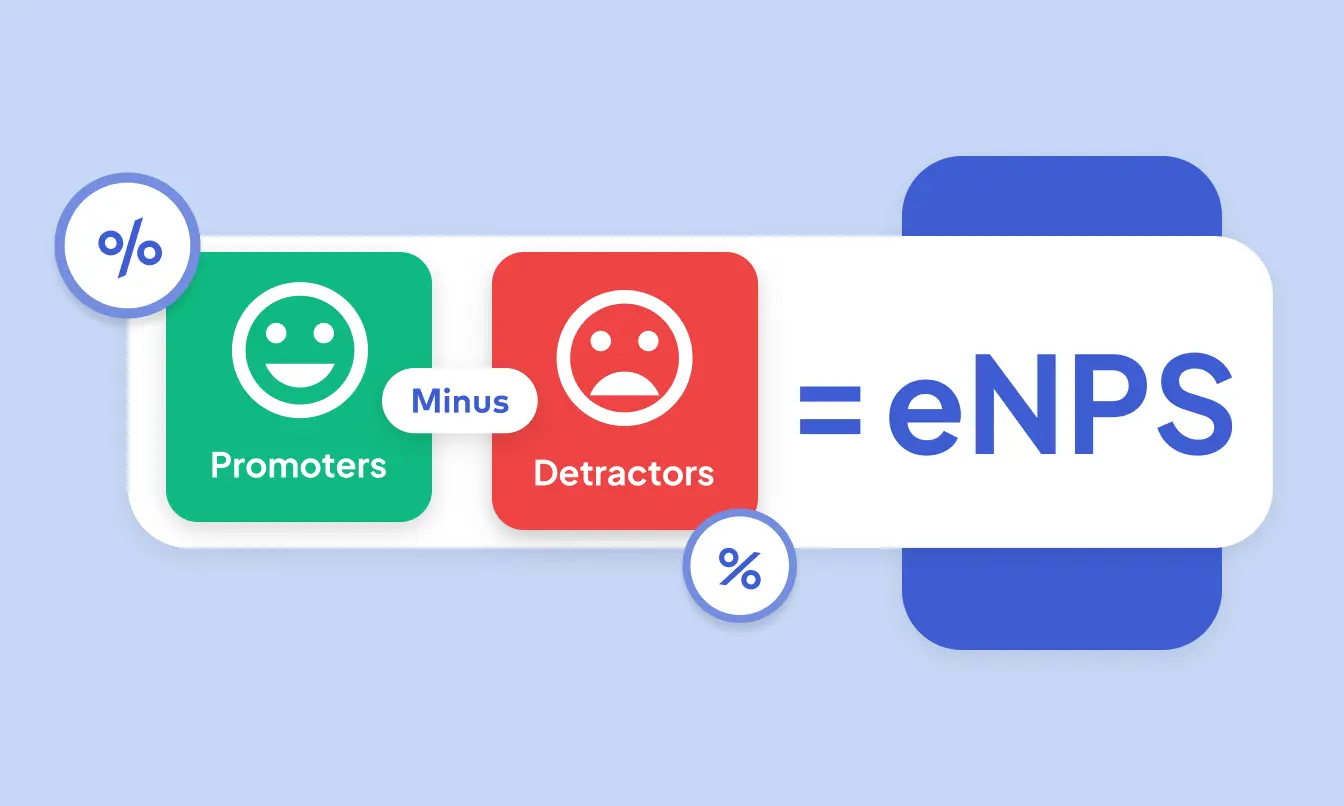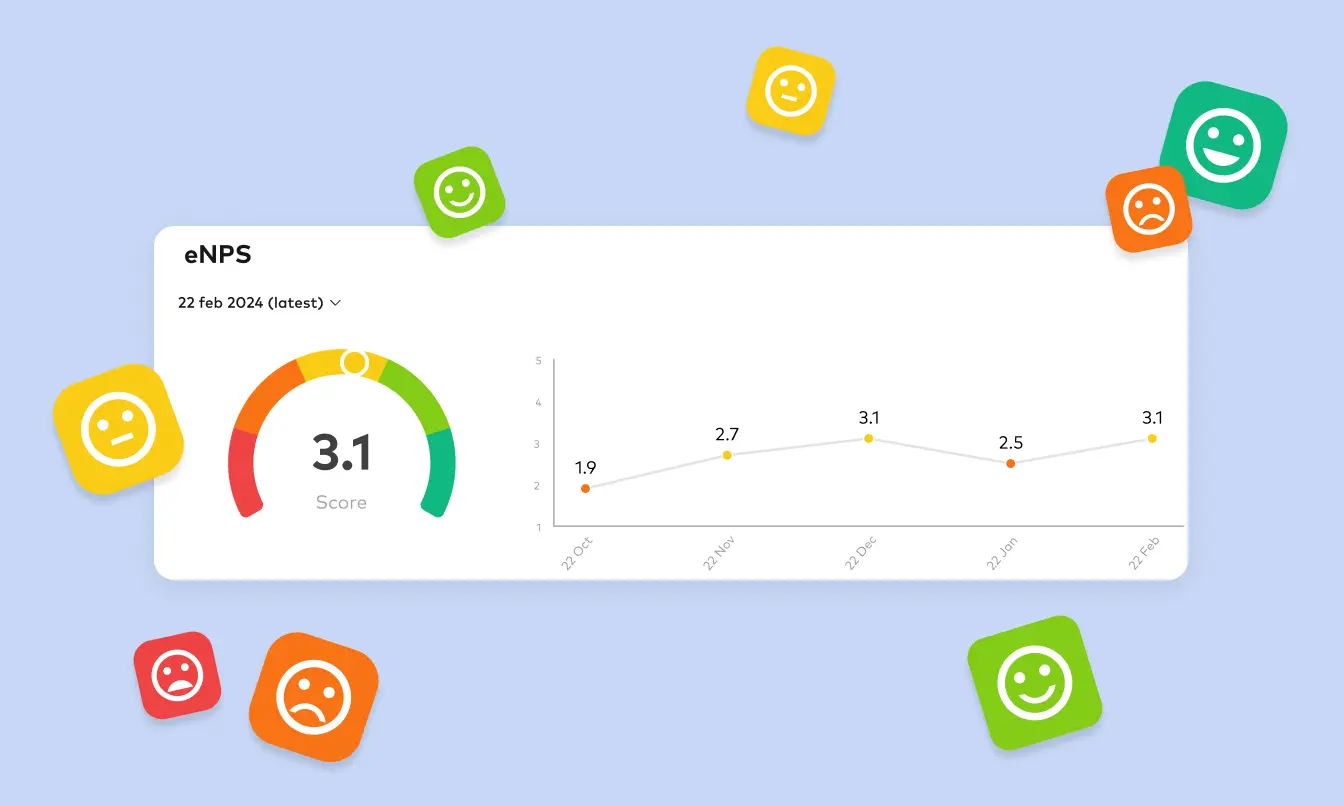
What is Employee Net Promoter Score (eNPS)?


- How To Calculate Your Organization’s eNPS Score
- The Origin of The eNPS
- Why You Should Conduct eNPS Surveys For Your Company?
- The Disadvantages of eNPS:
- How To Implement The eNPS In Your Organization
- How Often Do You Conduct Your eNPS Surveys?
- Case Studies
- Final Remarks On eNPS
The employee net promoter score (eNPS) is a tool designed to measure employee satisfaction and devotion toward the company.
It is a derivative of the Net Promoter Score (NPS) system founded by Fred Reichheld, Bain & Company, and Satmetrix in 2003 to measure customer loyalty. Apple was one of the pioneers in implementing eNPS at their company to measure its employee satisfaction.
The eNPS score indicates just how likely your employees are to recommend your company as a workplace.
Salary isn’t the sole determinant of employee experience (EX). Organizations must take innovative actions to make their employee’s time count by creating growth opportunities and challenges.
With many factors impacting the employee experience, the eNPS index helps ease the improvement process.
Research by Gallup shows that high levels of employee engagement lead to more profits across the organization.
Promoting the use of eNPS would encourage organizations to take proactive steps to elevate their environment and company culture.
The eNPS is a great non-costly tool to implement to measure the work environment in your organization.
At agyleOS, we help you better comprehend eNPS. Contact us for a uniquely designed eNPS question template, Employee Survey Software, or even just a consultation.
Our Employee Survey Systems allow you to have specifically designed eNPS surveys to serve your company’s needs.
How To Calculate Your Organization’s eNPS Score

Calculating the score of the eNPS is straightforward and similar to the NPS calculation.
An ordinary and non-specific eNPS survey has only one goal: evaluating just how likely an employee is to recommend your organization as a workplace on a scale of 0 to 10.
Based on the answer, each employee would go into one of these three categories:
- Promoters (9–10): These employees are highly engaged and satisfied with your organization. They are also your best advocates in recruiting new staff.
- Passives (7-8): These employees are generally satisfied with how things work. However, given the circumstances, they can become promoters or detractors.
- Detractors (0–6): These employees are unhappy with your company. Addressing their needs will upgrade your retention rate and save your brand’s reputation.
A company’s score is calculated based on the percentage of the first and third categories, disregarding the passive employees no matter how large a group they form.
To calculate the eNPS score, you must subtract the percentage of Detractors from the percentage of Promoters.

eNPS = % Promoters – % Detractors

The eNPS ranges from -100 to +100.
Higher scores indicate happier and more engaged employees.
By learning their score, companies can comprehend their environment’s level of health and accommodation.
Suppose you need more information on calculating your organization's eNPS score and have a grip on where you stand with employee satisfaction. In that case, we suggest you take a look at our article “How To Calculate The Employee Net Promoter Score?”
The Origin of The eNPS
The eNPS methodology is derived from the old Net Promoter Score (NPS), which assesses customer experience, founded by Fred Reichheld, Bain & Company, and Satmetrix in 2003.
While both NPS and eNPS indirectly help organizations achieve higher profits, the difference between them is that eNPS is a metric crafted to evaluate to which degree an employee would recommend their company.
In contrast, NPS surveys assess how customers or community members feel about an organization's particular product or service.
Both eNPS and NPS help your organization thrive and be more productive. However, you should know there are some distinctions between them. To fully understand the differences between NPS and eNPS, we recommend you check “The Differences Between NPS and eNPS”.
Why You Should Conduct eNPS Surveys For Your Company?
eNPS is a standard metric with several unique features. Organizations can benefit from eNPS surveys to improve employee satisfaction and enhance productivity.
Here are some notable advantages of the eNPS:
1. Simplified Employee Engagement Measuring:
The test is simple and quick!
The participation rate is high since It doesn’t take much of the employees' time.
Besides, the sheer quantitative measure would instantly tell you whether or not your employees are satisfied with your organization.
2. Sustainability:
Since the test is quick, it can be done continuously. A company tracking eNPS scores would have valuable insights into trends and areas to encourage its system.
If a company achieves continuous high scores on the eNPS surveys, the workplace is positive, and the employees are the least likely to turn over to rival companies.
However, progressive lower scores show potential problematic issues relating to a low-quality work environment.
If a company fails to address the declining trend in their numbers, they may encounter complex challenges with their staff.
Moreover, Consistently low employee satisfaction will cause a bad reputation and a breakdown for the company in the long term.

3. Objectivity:
The eNPS scoring results are solely about the employee experience. This means that the scoring system is independent of the owners’ opinion.
The objectivity of eNPS ensures that the identified areas for improvement are genuine.
4. Benchmarking:
eNPS scores appear as an early warning to companies with declining records. By examining the underlying issues, such as poor leadership, lack of job development, communication issues, weak services, etc., a company can address the problems early on to prevent turnovers and bad employee feedback.
Additionally, by working on the eNPS numbers, organizations can compare their employee satisfaction level with different departments, locations, job roles, and even rival companies.
This helps them target their strengths and weaknesses besides achieving better productivity.
5. Cost-effectiveness:

eNPS surveys sound easy and cheap enough to deploy. Nevertheless, a genuinely effective survey would consist of features complementing your organization.
If you decide to conduct an eNPS survey for your company, we suggest you take the route with the most benefits. Otherwise, eNPS surveys could frustrate your employees and cause undesirable consequences if executed poorly.
Employees are the heart of a company; the more engaged they are, the more productive your company is. Spending your resources on your staff's satisfaction is an investment for your organization in the long run.
Analyze, optimize, and enhance your company culture! Stand out from your competition with agyleOS
6. Higher Earnings Per Share:
According to a study done by Gallup, engaged employees enhance profitability by 21% and productivity by 17% compared to other companies with disengaged personnel.
This study figured that companies with engaged workforce outperformed their rivals.
7. Building a Strong Employer Brand:
A company's best advertisement is its engaged and satisfied employees.
By conducting a standard and specific eNPS survey and addressing the possible issues of your employees, the employee-manager bond gets stronger, and you become popular among your staff.
8. Identifying Areas For Improvement:
The follow-up questions in an eNPS survey lead you to your points of weakness and strength.
By enhancing your solid suits and addressing your underlying issues, you will reach a healthier, more positive, and engaging work culture.
The Disadvantages of eNPS:
- eNPS has limited results and relies solely on the numbers without considering other aspects of the employee experience, such as sentiment and motivation.
- The given number to measure the employee experience is only quantitative and needs more quality aspects.
- The calculation of eNPS leaves the Passives out, which can affect the score adversely if they’re the majority group of an organization.
Note that the eNPS should not be viewed solely but as part of a comprehensive employee feedback strategy.
Combining eNPS with other metrics, such as employee engagement surveys, pulse surveys, 360-degree feedback, and exit interviews, can provide a holistic view of the employee experience and inform strategic decision-making to aim for the best possible version of productivity.
Suppose you find it hard to determine which employee satisfaction metric suits your company best, or you feel that eNPS would not fulfill your organization’s wishes.
In that case, we have prepared a list of substitutes and alternatives you can use instead of or even in combination with eNPS. You can read the article “What Are The Alternatives To eNPS?” to choose what works best for your company.
You can also contact our team at agyleOS to have an optimized plan for your employee engagement surveys.
We help you comprehend which survey suits you best, whether it be employee performance reviews, eNPS, etc
How To Implement The eNPS In Your Organization
Conducting an eNPS survey is not a challenge; however, applying it properly and taking action afterward is.
To achieve the optimum result, we suggest you consider a few recommendations:
1. Survey Design
Craft a specific survey with the central question and some follow-ups. Note that each organization has unique needs and requirements.
Therefore, the survey should match your company’s status. Consider doing eNPS surveys regularly to gain insights into your organization’s trends.
You might still need to figure out the perfect questions for your eNPS surveys. If that is the case, we recommend you look at what we have worked on to collect “eNPS Questions”. These sets of questions help you have a better understanding of satisfaction and loyalty measurement in the business world.
2. Keep It Anonymous
Constructive criticism comes from blunt honesty, and your employees are only candid if they have a sense of job security.
Ensure your employees that their responses are confidential and that their issues will be addressed immediately.

3. Analysis
The data itself isn’t going to do any good for your organization. You must carefully analyze and interpret the results to conclude what they indicate.
Note that you should preferably compare your company to its previous state and look into your patterns; each company is unique, and pressuring yourself to reach up to other organizations’ scores isn’t wise.
4. Taking Action
After your data analysis, you must start planning strategies to address the underlying issues concerning your employees.
Even if the score shows no apparent threat, you can always do better and achieve excellence.
5. Follow-up Surveys
Conducting one eNPS survey is acceptable if you want to know how your employees feel. However, it has no helpful impact on your organization’s status.
After taking proactive steps to improve employee engagement, you should conduct follow-up surveys to study the effects of your performance.
How Often Do You Conduct Your eNPS Surveys?
Firstly, knowing that each company is unique and we can’t have a definite answer for everyone is essential. However, there are some notes on the timing that are vital to consider:
1. Too Many Surveys:
The employee-management bond will weaken if you send out your surveys without acting on the previous ones.
Having too many surveys means having too much feedback for action. Losing your employees' trust is not an efficient method for an eNPS survey!
You should not apply eNPS surveys more than once a quarter of a year.
2. Timing Is Everything:
It is not wise for leadership to conduct surveys during busy office hours, whether near the holidays, bonus weeks, etc.
As management, you should be aware of the impact of such events on your employees.
The results of an eNPS conducted at such times are untrustworthy and won’t do your organization any good.
Case Studies
1. Company A
Company A conducted eNPS as one of their employee experience surveys.
Their results were +30, which means the company is in a good state. However, they know that the number alone will not suffice.
By applying follow-up questions in their eNPS survey, they found that their employees’ major issue was communication.
The management at Company A planned to take action by assembling focus groups, Q&A meetings with the presence of leadership, and other communicative events to enhance employee satisfaction.
Over time, Company A saw a significant increase in employee engagement and satisfaction.

2. Company B
Company B applies eNPS surveys regularly to check their organization’s trends. Recently, the numbers have been going from +56 to around +13.
Even though both numbers are positive and Company B is still in the clear zone, the management included specific follow-up questions in the eNPS surveys to locate the problem.
The results indicated that employees have progressive issues with their work-life balance.
Company B took the initiative to make work hours more flexible, introduced work-from-home options, and arranged higher overtime pay.
As a result, employees from Company B felt more valued and appreciated in their workplace, which increased their engagement and productivity.

Final Remarks On eNPS
In conclusion, the eNPS has become a valuable tool for organizations to measure and improve employee satisfaction and loyalty.
Understanding and promoting the eNPS helps us gauge the overall health of an organization to drive improvements in employee engagement and retention.
Considering the simplicity and effectiveness of the Employee Net Promoter Score methodology, organizations can gain worthwhile insights into the factors impacting employee engagement to take action and craft a more positive work environment.
Investing in employee satisfaction pays off dividends in terms of retention, productivity, and overall organizational success.
With agyleOS we help you have a better understanding of your team and your overall status. Contact us to have a consultation on your organization. Furthermore, we can help you plan a more robust strategy to boost employee morale.
Using our designed eNPS surveys, 360-degree feedback, or an overall skill matrix software, you can gauge your employee experience and enhance your team’s performance.
By submitting this form, I confirm that I have read the privacy policy and that I consent to the processing of my personal data by agyleOS for the purposes stated. In the event of consent, I can revoke my consent at any time. Furthermore, by submitting the form, I agree to the general terms and conditions.


- Product
- Resources
- Compare
- Company
